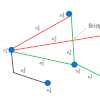Network evolution analysis: a usage-centric approach applied on cycling infrastructure
DOI:
https://doi.org/10.5311/JOSIS.2025.30.379Keywords:
openstreetmap, cycling network, data evolution, multiplex graph, route generationAbstract
Cycling practice is quickly increasing around the world, giving rise to the development of devoted infrastructure to protect its users and offer them a more enjoyable ride. Mobility infrastructure is represented in geographical databases, but these databases are often centered on car and pedestrian mobility. This causes some data quality problems like the lack of completeness or freshness. Volunteered geographical information (VGI) is affected by this kind of problem with a variable extent relying on the contributors' wish and skills. Research on VGI evolution for a network mainly focuses on the main usage of a road section, ignoring secondary information related to other road users of a specific section. This paper contains two contributions. To model the evolution, we define a multiplex graph where each layer represents a snapshot. It is implemented with an infrastructure class based on how cyclists perceive an infrastructure. We also present two complementary VGI road network evolution methods with a usage-centric approach on cycling. These approaches are adaptable for any usage of the network and are based on the multiplex graph. The first approach is based on the road sections, analyzing the evolution of each section individually. The second approach is based on randomly generated starting/ending points. These methods are illustrated in the Centre-Val de Loire region with OpenStreetMap.

Downloads
Published
Issue
Section
License
Copyright (c) 2025 Raphaël Bres, Arnaud Le-Guilcher, Verónika Peralta, Ana-Maria Olteanu Raimond, Cyril de Runz, Thomas Devogele

This work is licensed under a Creative Commons Attribution 3.0 Unported License.
Articles in JOSIS are licensed under a Creative Commons Attribution 3.0 License.
